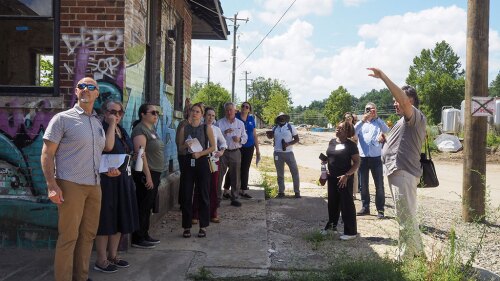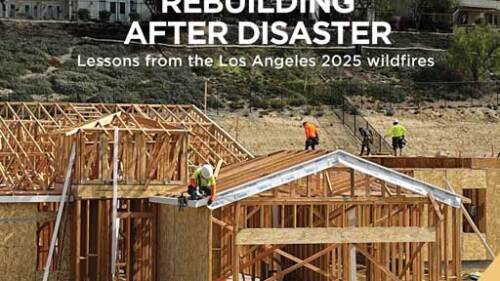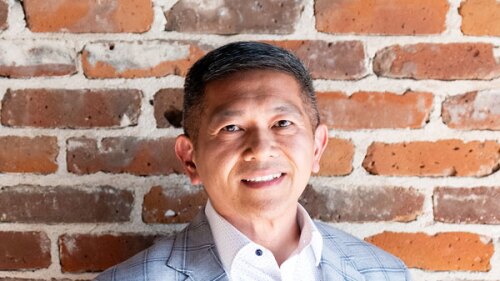Panelists speaking at the 2018 ULI U.K. Annual Conference said that disruptive change—ranging from the safe use of autonomous vehicles to greater energy efficiency districts to rethinking city governments outside London—requires public engagement, forethought, and transparency.
Anthony Poole, head of developers and real estate sales at E.ON, who related the work his company is doing on installing and promoting the benefits of district heating, said: “We take as our starting point the fact that we want to provide secure, low-carbon, affordable heating for our customers.
“We install and operate district heating, and once you’ve got the pipes in the ground you have future-proofed energy in your development. We’ve got a network that runs through London, so if you’re developing nearby you can connect to that kit and save space in a building.”
As an example, Poole described the work that E.ON has done with Waltham Forest council, which involved serving four large developments from one energy center. “There were huge capital and operational expenditure savings,” he said, adding that intelligent data analysis means that district heating can often serve far more properties than first thought. “It’s about optimizing energy centers. We were able to connect a 500-home development to a center already serving 1,000 homes because of the efficiencies.”
However, in terms of maximizing the benefits of district heating, Poole said that it is best that developers work with E.ON from as early a stage in a project as possible. He cited his company’s work with Lendlease on the vast redevelopment of Elephant & Castle as a key case study. “We talked to the developer early on about macro-planning,” said Poole.
“It was difficult, not least because of the tree preservation orders, but we were able to provide a solution before there was a spade in the ground. Again, it was about starting with the customer proposition—if you design for people, good buildings will follow and there are huge savings to be had.”
Engagement was also critical to another panelist’s work. Anne Mellano, cofounder of tech platform Best Mile, is developing what she described as a “smart mobility platform” for autonomous vehicles (AVs) that ultimately will allow multiple operators to use the platform so that the next generation of transport works as efficiently as possible.
The idea is that fleets of AVs will eventually provide a shared service and replace individual car ownership in major urban areas, thereby “reducing the number of vehicles on the road and dramatically improving the quality of the environment.” However, Mellano was realistic that the “switch over won’t happen overnight, so we need to work on incorporating it into the existing system.”
In order for the system to work, Mellano added, it will need to communicate in real time with multiple other systems and service providers, including the technology that allows vehicles to work autonomously, other urban transport systems, and services that provide data on traffic volumes and the weather, to name just two. “We’re only one brick, but we are at the heart of the system,” she said.
Better engagement was also at the heart of the final speaker’s presentation. Andrew Carter, chief executive officer of the Centre for Cities, a think tank, said that cities across the United Kingdom are becoming increasingly assertive about what they want from both the government and the private sector in terms of investment and growth.
“Many have not seen any investment since 2008 and are demanding that they don’t get left behind,” he said. “There is a very real concern that London dominates and there needs to be a rebalancing of the economy. We talk about national GDP growth, but many places are still in recession.”
Carter added that substantial new powers equivalent to those already enjoyed by the mayor of London, such as power over transport, are urgently needed in other cities, especially those that elected metropolitan-level mayors last year. “Other places are demanding new powers,” he said. “Just look at the hammering the government is getting about Northern Rail—they’re getting absolutely hammered by the new mayors.”
Without such powers, Carter argued, other cities cannot hope to create integrated transport systems such as that seen in London, something that also has implications for the development of new systems such as AVs. “If you think about it, only London has a regulated transport system,” he said.
“Everywhere else is a free-for-all. We can open up outer areas of cities by better integrating them. Institutions like Transport for London [TfL] really matter—they generate the data that others can then use. We’re flying blind in other places. Sometimes the bus companies share data, sometimes they don’t.”
Mellano agreed on the importance of both sharing data and institutions. “Institutions are important because we can then analyze the data they create. We will see some new regulation for cities. Today, you have a big operator like TfL and we will need more of the same with shared services.”
So, from disparate spheres—energy, digital technology, and public policy—some key shared themes emerged, not least the importance of engagement, sharing knowledge, and putting the needs of customers and residents first.




